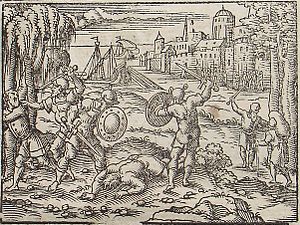Cultural pessimism
Cultural pessimism of the Oswald Spengler epoch might be seen as a refusal of the rather intellectual and secular choice between nihilism and modernism.
It was fashionable to say that Spengler had at least formulated some truths about the cultural situation of Europe after World War I. Eliot's major early work The Waste Land (1922) was commonly and directly interpreted in those terms.
The very title of Jacques Barzun's From Dawn to Decadence: 500 Years of Western Cultural Life, 1500 to the Present (2000) challenges the reader to be hopeful.
p.573)The end of the millennium saw in the United States concerns rather specific to the conservative view on the culture wars and university education.
[clarification needed] Western Europe, on the other hand, struggled towards self-definition in the face of limiting demography, and postmodernism as at least journalistically predominant—the difference primarily lying in the political prominence of the issues.

